
Rajasthan Eco-Tourism Policy 2021

In July 2021 , the Rajasthan State Government released the Rajasthan Eco Tourism Policy 2021 with an aim to generate economic benefits after conserving natural areas and attracting tourism in Rajasthan . Earlier in September 2020, the State Government had released the consolidated Rajasthan Tourism Policy 2020 which inter-alia laid stress on development of Eco-tourism in Rajasthan .
Rajasthan Eco Tourism Policy Background
Around 9% of state’s land is under the administrative control of the Forest Department, with 3 National Parks , 3 Tiger Reserves , 27 Wildlife Sanctuaries , 2 Ramsar Sites , 14 Conservation Reserves and many niche faunal habitats in addition to vast expanse of desert ecosystem, the old Aravalli hill range, rich biodiversity, dense forests, host of water bodies and scenic places.
The State Government had released the first eco-tourism policy in 2010 and there was need to update the policy to create synergy between forest and local communities who will manage these sites and earn their livelihood from the resulting growth in tourism activities.
There is a need of having a policy document that enables, certifies and facilitates the efforts of the tourism sector in a manner which is eco-friendly in natural areas.
Definition of Eco-Tourism:
Rajasthan Eco Tourism Policy 2021 defines Eco-Tourism as a form of sustainable tourism within a natural or cultural heritage area where community participation, protection and management of natural resources, culture, indigenous knowledge and practices, environmental education and ethics, as well as economic benefits are fostered and pursued for the enrichment of host community and satisfaction of visitors.
Further, The Ministry of Environment, Forest and Climate Change (MoEFCC) describes Ecotourism as ‘responsible travel to natural areas that conserves the environment and improves the well-being of local people’.
Characteristics of Eco-Tourism:
The Policy also defines characteristics of Eco-Tourism based on World Tourism Organisation (UNWTO) as:
- Tourism where the main motivation of the tourists is the conservation and appreciation of nature as well as the traditional cultures prevailing in natural areas.
- Contains educational and interpretation features.
- Minimises negative impacts upon the natural and sociocultural environment.
- Supports the maintenance of natural areas which are used as ecotourism attractions by generating economic benefits for host communities, providing income opportunities for local communities and increasing awareness towards the conservation of natural and cultural assets.
Salient Fetaures:
- Considers communities as the most vital pillar of ecotourism in the state.
- Identifies that carefully designed ecotourism initiative shall have the potential to contribute both to ecological conservation and local community development.
- The forest department will be the nodal department for implementing the ecotourism policy.
- The Rajasthan Eco Tourism policy 2021 will remain in operation for a period of 10 years from the date of notification.
Ecotourism activities to be permitted:
The policy defines, Eco Tourism activities as nature-based activities exclusively performed to sensitize people about the beauty, richness and fragility of the state’s natural and cultural heritage, and shall not just focus on creating destinations in natural area or using natural environment for outdoor activities.
Ecotourism activities have to be coordinated by a qualified nature and cultural interpreter trained to entertain and educate the visitors.
Permitted activities include:
- Trekking, nature walk, bird and wildlife watching, hiking, flora and fauna observation, photography, etc.
- Boating / River Cruising to view wildlife and experience wilderness.
- Overnight Camping /Star Gazing in designated sites / forts / other monuments.
- Any travel focussed on experiencing Rajasthan’s fairs and festivals which promote eco-tourism and sustainability of local traditions.
- Lodging in campsites, eco-lodges, homestays andguesthouses that are located in an area of natural and/ or cultural beauty, and involves local specificities and
- Activities in specified areas of the forests such as jungle safari in vehicles or elephant / camel safari, trekking / nature walk, overnight camping in designated sites, bird watching and study of flora & fauna, etc
As per the policy, all ecotourism activities will be in conformity with the existing environmental laws of the country, including:
- Wildlife (Protection) Act, 1972,
- The FCA 19802, the Environment Protection Act, 1986,
- The Environment (Protection) rules 1986 and rules for Eco sensitive zones,
- NTCA guidelines,
- Rajasthan Tourism Policy 2020,
- Directives of Supreme Court of India and National Green Tribunal.
Policy Implementation:
Rajasthan Ecotourism Policy 2021 shall be implemented by Rajasthan Forest Development Corporation and administered by the Forest Department Government of Rajasthan .
Marketing : However, for the purposes of branding, promotion, marketing Rajasthan Ecotourism Policy 2021 shall be considered to be a part of Rajasthan Tourism Policy and shall be promoted by the Rajasthan Tourism Department , Government of Rajasthan.
The Rajasthan Ecotourism Development Society (REDS) registered under the Rajasthan Societies Registration Act 1963 shall be reconstituted and will act as an advisory and oversight body for the Rajasthan Ecotourism Policy.
District Level :
- To implement the policy at the district level, a district ecotourism committee (DLEC) will be constituted under the chairmanship of the district collector with deputy conservator of forests (territorial) as member secretary.
- It will also have members from other stakeholder departments such as revenue, tourism, tribal development, rural development etc. to promote, manage and regulate ecotourism sites.
- The DLEC will be free to invite opinion from the experts in the field of tourism and hospitality sectors operating in their district.
Rajasthan Eco Tourism Policy 2021
Related Posts

Rajasthan CM dedicates projects for Jaipur smart city

RAS Current Affairs: 29 June

RAS 2017: Notification to be released soon

अन्नपूर्णा भण्डार योजना 5000 अन्न्पूर्णा भण्डार का लक्ष्य अर्जित
Ecotourism in Rajasthan: Prospects and Perspectives
- First Online: 01 January 2013
Cite this chapter

- Shailja Sharma 4 ,
- B. K. Sharma 5 ,
- Seema Kulshreshtha 6 &
- Smriti Johri 7
560 Accesses
1 Citations
This chapter touches upon the newly emerging concepts of ecotourism and heritage tourism. The state harbors a wealth of mesmerizing palaces and forts, World Heritage sites and hotels, vibrant cultural traditions, and fairs and pilgrimage sites which attract a large number of national and international tourists. In addition, the national parks and tiger reserves, world famous heronry, colorful desert, and wildlife sanctuaries located in diverse habitat draw the attention of wildlifers and nature lovers from around the world. Potential ecotourism sites still in wilderness and unexploited by the rapid pace of civilization have been selected and listed district-wise on the basis of forest areas with rich biodiversity, natural scenic beauty, waterfalls and springs, historical buildings, palaces, forts, and temples. In this chapter, authors have mentioned about the proposed activities and value addition being brought through camping and wide publicity as major strategies for developing these ecotourism sites. The prospects in the Hadoti region of southwestern Rajasthan as a potential ecotourism attraction with birding sites and adventure tourism are also particularly described. To this end, the emphasis of the government has been on community-based ecotourism, encouraging public–private sector participation, and infrastructural development. The major stakeholders of the plan are forest, tourism, and finance departments of the state government, local communities, private sector, NGOs, and academic institutions. Economic benefits to local people and tribal youth, building public support for conservation, and encouraging conservational efforts are some of the key advantages of ecotourism which are described in the text. The authors have looked into the policies and prospects of wildlife tourism in Rajasthan. The issues and problems related to implementation of the Ecotourism Policy by the government along with the formation of an “Ecotourism Advisory Bureau” also find a prominent place in the chapter.
This is a preview of subscription content, log in via an institution to check access.
Access this chapter
- Available as PDF
- Read on any device
- Instant download
- Own it forever
- Available as EPUB and PDF
- Compact, lightweight edition
- Dispatched in 3 to 5 business days
- Free shipping worldwide - see info
- Durable hardcover edition
Tax calculation will be finalised at checkout
Purchases are for personal use only
Institutional subscriptions
Tod J (1920) Annals and Antiquities of Rajasthan, vol I. Motilal Banarsidas Publishers Private Limited, New Delhi, Reprint 1994, pp 113
Google Scholar
McCann C (1942) A Bushman’s holiday in the Abu hills. J Bom Nat Hist Soc 43(2):206–217
McCann C (1943) The rains come to the Abu Hills. J Bomb Nat Hist Soc 43(4):641–647
Coulson AL (1933) The geology of Sirohi State. Rajputana Mem Geol Surv India 63-I:166
Heron AM (1953) Geology of Central Rajasthan. Mem Geol Surv India 79:339
Roy AB (ed) (1988) Precambrian of the Aravalli Mountain, Rajasthan, India. Geological Society of India, Bangalore, pp 279–284
Raizada MB (1954) A botanical visit to Mt. Abu Ind Forest 80(4):207–215
Champion HG (1936) A Preliminary survey of the forest types of India and Burma. Ind For Rec (ns) Silvic 191:1–204
Butler E. A Note on the avifauna of Mount Aboo and Northern Guzerat; 1875–1877. Stray Feathers. 3 (6): 437–500; 4 (1, 2 & 3):1–41; 5 (3–4): 207–236
Prakash I, Singh P (1995) Some observations on the birds of Abu hill, Aravalli Ranges. Pavo 33(1&2):99–110
Lodhiya C (1999) Sightings of Green Munia ( Estrilda formosa) at Mt. Abu. Newslet Birdwatch 39(4):61
Tiwari JK, Varu SM (1999) Sightings of Green Munia ( Estrilda formosa) in Gujarat and Rajasthan. Newslet Birdwatch 39(2):29–30
Mehra SP, Sharma S, Mathur R (2005) Munias of Mount Abu (Rajasthan, India) with special emphasis on Green Avadavat Amandava Formosa . Indian Birds 1(4):77–79
Download references
Acknowledgements
Authors are thankful to Mr. Sunil Singhal, Kota, Mr. Devendra Bhardwaj, Ms. Sonali Singh, Udaipur, and Mr. Anish Andheria, Sanctuary Asia, for providing excellent pictures.
Author information
Authors and affiliations.
Department of International Business and Management, Manchester Business School, The University of Manchester, Booth Street, West Manchester, M15 6PB, UK
Shailja Sharma
Department of Zoology, R.L. Saharia Government P.G. College, Kaladera (Jaipur), Rajasthan, India
B. K. Sharma
Department of Zoology, Government Shakambhar P.G. College, Sambhar Lake (Jaipur), Rajasthan, India
Seema Kulshreshtha
Department of Zoology, JDB Government Girls College, Kota, Rajasthan, India
Smriti Johri
You can also search for this author in PubMed Google Scholar
Corresponding author
Correspondence to B. K. Sharma .
Editor information
Editors and affiliations.
Department of Zoology, RL Saharia Govt. PG College, Jaipur, Rajasthan, India
B.K. Sharma
Department of Zoology, Government Shakambhar PG College, Jaipur, Rajasthan, India
Bombay Natural History Society, Mumbai, Maharashtra, India
Asad R Rahmani
Rights and permissions
Reprints and permissions
Copyright information
© 2013 Springer International Publishing Switzerland
About this chapter
Sharma, S., Sharma, B.K., Kulshreshtha, S., Johri, S. (2013). Ecotourism in Rajasthan: Prospects and Perspectives. In: Sharma, B., Kulshreshtha, S., Rahmani, A. (eds) Faunal Heritage of Rajasthan, India. Springer, Cham. https://doi.org/10.1007/978-3-319-01345-9_18
Download citation
DOI : https://doi.org/10.1007/978-3-319-01345-9_18
Published : 19 August 2013
Publisher Name : Springer, Cham
Print ISBN : 978-3-319-01344-2
Online ISBN : 978-3-319-01345-9
eBook Packages : Biomedical and Life Sciences Biomedical and Life Sciences (R0)
Share this chapter
Anyone you share the following link with will be able to read this content:
Sorry, a shareable link is not currently available for this article.
Provided by the Springer Nature SharedIt content-sharing initiative
- Publish with us
Policies and ethics
- Find a journal
- Track your research

+91-9820560980
Eco-tourism in Rajasthan

Background:
Fundamentally, eco-tourism means making as little environmental impact as possible and helping to sustain the native population. Thereby encouraging the preservation of wildlife and habitats when visiting a place. This is a responsible form of tourism and tourism development. It encourages going back to natural products in every aspect of life. It is also the key to sustainable ecological development, to be aware of the environment.
Today, the ‘Green Laws’ of conservation are making people aware of how man and the environment can live symbiotically for more time to come and eco-tourism is the only way to maximize the economic, environmental and social benefits of tourism. Everyone is a stakeholder in the process. As aresult, we clearly need to avoid our past shortcomings and the negative impact that they have had. In India too the movement is gathering momentum with more and more travel and travel related organizations. The tourism industry is addressing the needs of the eco-tourists and promoting eco-tourism in the country.
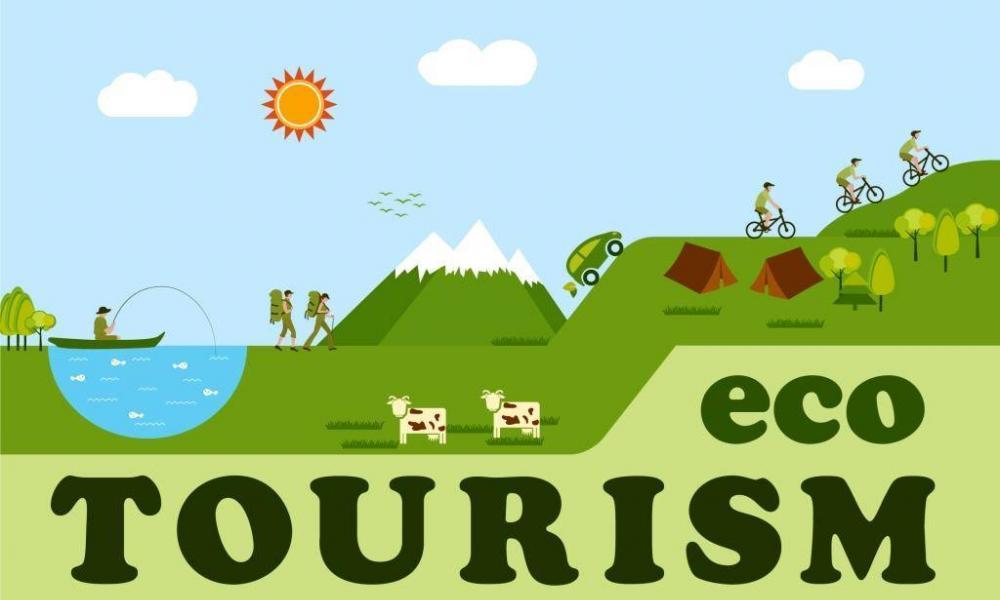
Eco-tourism Policy of Rajasthan,2021
In July 2021, the Rajasthan State Government released this policy with the aim to generate economic benefits whilst conserving natural areas and attracting tourism to the state – this is an amendment to the original 2010 policy.
The policy defines Eco-tourism as:
“Tourism where the main motivation of the tourists is the conservation and appreciation of the ecosystems in the environment as well as the traditional cultures prevailing in natural areas…contains educational and interpretation features…minimizes negative impacts upon the natural and sociocultural environment…supports the maintenance of natural areas which are used as eco-tourism attractions by generating economic benefits for host communities, providing income opportunities for local communities and increasing awareness towards the conservation of natural and cultural assets.”
Permitted activities under this policy include:
- Trekking, nature walk, bird and wildlife watching, and flora and fauna photography
- Boating, river cruising to view wildlife and experience wilderness
- Overnight camping, star-gazing in designated sites/forts/monuments
- Travel focussed on experiencing Rajasthan’s fairs and festivals that promote eco-tourism and sustainability of local traditions
- Lodging in campsites, eco-lodges, homestays and guest houses that are located in an area of natural/cultural beauty and involves local specificities
- Activities in specified areas of the forest such as jungle safari in vehicles or elephant/camel safari, overnight camping in designated sites.
How Tourists can Support Eco-tourism :
- Using locally owned and run services .
- Using locally owned and run accommodation. Not only does the money from homestays directly benefit the community but tourists also gain an authentic insight into the region.
- Purchase any and all equipment and food from locally produced sources.
- Support local income generating and small business enterprises. This is possible by supporting locally owned transportation, shops and restaurants, and using local guide and staff services.
- Taking responsibility for maintaining and improving the environment.
- Provide financial support for local economic and environmental projects that will benefit the local communities and thereby actively encouraging local community involvement in the tourism projects.
- Elephant and camel rides are a big no no. Rides on these animals are especially popular for tourists in the state of Rajasthan. The manner in which elephants are treated in order to be habituated for humans is unethical and cruel. Therefore, we must therefore always avoid such thrills.

Responsible Eco-tourism Tips for Rajasthan’s Tourists :
- Water usage is not surprisingly an issue in the desert and you certainly do need to drink bottled mineral water. But packing vehicles with several plastic bottles just isn’t the way to go. Ask your tour operator in advance if they have a policy about this, so that you can bring your own bottle and refill it from large water containers
- Jeeps should never go over 20kmph in the national park, so ensure your driver keeps to that. Ensuring minimum noise levels provides peaceful environment to the wildlife.
- If you come across camel meat in Rajasthan, be aware that slaughtering it for meat is illegal in the state. Also, it means it is done under the radar. It was made the state animal in 2014 in order to try to highlight its importance and to put a stop to their dwindling numbers.

In a Nutshell:
Globally tourists know Rajasthan for its diversity in natural resources, cultural heritage, historical as well as archeological wonders and rare wildlife. Consequently, there is tremendous potential for eco-tourism in the state. As eco-tourists, we must strive to preserve local resources wherever possible. In addition to the tips mentioned in the listicle above, we must be aware of the impact of our money and choosing sustainable local businesses to spend our money on. Places we can support as eco-tourists are Sundha Mata temple in Jalore, Bassi in Chittorgarh, Kumbhalgarh in Rajsamand and Bhilwa’s Hamirgarh and Menal – which have all been developed as per the new eco-tourism guidelines.
Also follow Rajasthan Studio on Instagram for more amazing travel content. Reach out to us on email at contact[at]rajasthanstudio[dot]com. This blog is curated by Rajasthan Studio and written by Samira sarin.
[…] Fact: The puppet masters of Rajasthan used their Art to entertain people and provided social and moral education through their […]
Your email address will not be published. Required fields are marked *
Save my name, email, and website in this browser for the next time I comment.

Information
- Privacy Policy
- Refund Policy
- Terms & Conditions
- Milestones & Awards
Ahinsa Marg, Adinath Nagar, JLN Road, Opp WTP, Jaipur, Rajasthan 302018
Privacy Overview

- jaipur News
Rajasthan: Nature promotion and job creation part of eco-tourism policy
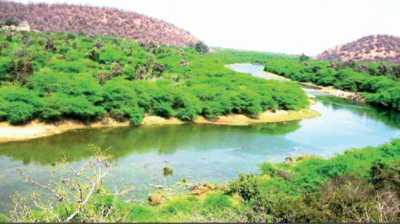
Visual Stories

Desi Diaries
Greetings vagabonds
- Sep 15, 2023
Eco-Tourism in Rajasthan: Exploring Sustainable Travel Options
Rajasthan, often celebrated for its royal palaces, vibrant culture, and desert landscapes, is also making strides in the realm of eco-tourism. In a world increasingly focused on sustainability, Rajasthan is emerging as a destination that combines its rich heritage with a commitment to environmental conservation. In this blog, we'll embark on a journey through Rajasthan's eco-tourism initiatives and discover how travelers can explore this magnificent state while treading lightly on its precious ecosystems.

Ranthambore National Park: A Haven for Wildlife Enthusiasts
Ranthambore National Park is a prime example of eco-tourism in Rajasthan. This protected area is not only home to the majestic Bengal tiger but also boasts a diverse range of flora and fauna. Visitors can embark on responsible wildlife safaris, guided by experts who prioritize animal welfare and conservation. The revenue generated from eco-tourism helps fund conservation efforts in the park.
Desert Safari with a Green Twist
While the Thar Desert's vast expanse is a captivating sight, it's essential to explore it sustainably. Many tour operators in Rajasthan now offer eco-friendly desert safaris using camels instead of motorized vehicles, reducing carbon emissions and minimizing the impact on fragile desert ecosystems. These tours often include visits to local desert communities to promote responsible tourism.
Heritage Homestays: Immersive and Eco-Friendly
Staying in heritage homestays provides travelers with an authentic experience while supporting local communities. Many of these properties are now incorporating sustainable practices such as rainwater harvesting, waste reduction, and organic farming. Guests can enjoy the warmth of Rajasthani hospitality while minimizing their environmental footprint.
The Beauty of Organic Farmstays
Organic farmstays are gaining popularity in Rajasthan, offering visitors a chance to connect with nature and savor organic, locally sourced meals. Travelers can participate in activities like farming, traditional cooking lessons, and nature walks. These experiences promote sustainable agriculture and provide insights into Rajasthan's rural life.
Birdwatching Sanctuaries
Rajasthan is not only about deserts; it's also home to some incredible birdwatching destinations. Keoladeo National Park in Bharatpur, for instance, is a UNESCO World Heritage site and a vital habitat for migratory birds. Guided birdwatching tours are not only educational but also contribute to the park's preservation.
Solar-Powered Accommodations
To reduce their carbon footprint, several eco-conscious accommodations in Rajasthan have adopted solar power. From luxury hotels to budget-friendly lodges, solar panels are increasingly becoming a common sight on rooftops. Travelers can enjoy modern comforts with the satisfaction of knowing their stay is powered by renewable energy.
Promoting Responsible Trekking and Hiking
Rajasthan offers picturesque landscapes for trekking and hiking enthusiasts. To preserve the natural beauty of these regions, eco-tourism companies now organize responsible trekking tours. These tours often include waste disposal education and support local communities.
Rajasthan's commitment to eco-tourism is not only an opportunity for travelers to explore its beauty but also a testament to the state's dedication to preserving its natural heritage. By embracing sustainable travel options, Rajasthan showcases the harmonious coexistence of tradition and modernity. Whether you're exploring the wilderness, staying in heritage accommodations, or participating in organic farming, Rajasthan's eco-tourism initiatives invite you to experience the state's wonders while being a responsible traveler. So, pack your bags, tread gently, and savor the vibrant, eco-friendly Rajasthan.
Related Posts
Bird Watching in Jaipur: Top Spots for Bird Enthusiasts
Exploring the Flora and Fauna of Jaipur’s Parks and Reserves
Royal Dining: Experiencing Traditional Rajasthani Thalis in Jaipur

You have Successfully logged In !

Register your account
Already have an account? Login --> Login
By clicking Register you agree to the Terms & Conditions and acknowledge our Privacy Policy.

Register using

Login to your account
Don't have an account? Register
Login using

Forgot password
Enter your E-mail address below, We will send the verification code
Verify your email
Please enter the code send to
Didn't receive the email? Click to resend
Set new password
- At least 12 characters
- A combination of uppercase letters, lowercase letters, numbers and symbols.
- Significantly different from your previous passwords.
Password reset successfully!
Your password has been successfully reset!.
Please login again to access your account.
An OTP has been sent to
Change Email
Enter the 4-digit code

Exploring Rajasthan: New Plan for Eco-Sensitive Zones

A short description of what is shown in the image above
By Krishna Raghav, Aravindh Nag, Swetha Ganesh
April 25, 2023 11:19 am | Updated 11:56 am IST
Published on December 28, 2023

Most Read In News

Ramee Group of Hotels Unveils Ramee The Srinivas Palace in Bhuj
Ramee Group of Hotels proudly announces the opening of Ramee...

Chef Vedangi Gawde Triumphs as India's Callebaut Pâtissier o...
The prestigious Callebaut Pâtissier of the Year 2024 competi...

The Leela Palaces, Hotels and Resorts Advances Hospitality L...
The Leela Palaces, Hotels and Resorts, renowned for its luxu...

Roastea Opens Flagship Lifestyle Cafe in Bengaluru
Roastea, one of India’s fastest-growing beverage brands, is ...
IndiGo to Host IATA’s 2025 Annual General Meeting in Delhi

By Nithyakala Neelakandan
Published on June 4, 2024

Southern African Countries Plan Expansion of Univisa to Boost Tourism

By Nishang Narayan
Published on June 3, 2024

Airbnb Unveils Summer Travel Trends: Bollywood and Social Media Drive Indian Vacation Choices

Published on May 31, 2024

Stay up-to-date with the latest Hospitality news and trends in the Hospitality industry!
Subscribe to Hospitality news e-magazine for free and never miss an issue.
By clicking subscribe for free you agree to the Terms & Conditions and acknowledge our Privacy Policy.
Advertise With Us
We have various options to advertise with us including Events, Advertorials, Banners, Mailers, etc.

Welcome to post your talent
A platform dedicated to showcase the skills and creativity of hospitality professionals. Share your articles, videos and other content related to the industry and get recognized for your unique perspective and expertise. By posting your content and gaining likes from your own community, we'll categorize your talents and expose them to the hospitality world. Join our community of passionate hospitality professionals and let your talent shine!.
Register to continue to posting
Already have an account? Login
By clicking you agree to the Terms & Conditions and acknowledge our Privacy Policy.

Advertise with us
- Down to Earth
- Gobar Times
- Rain Water Harvesting
- India Environment Portal
- Renewable Energy
- Green Clearance Watch
India Environment Portal Knowledge for change
- Climate Change
- Green clearance watch
- Down To earth
Feature Articles
Herd size dynamics and observations on the natural history of Dugongs (Dugong dugon) in the Andaman Islands, India
More »
Data, Statistics & Infographics
Presentations, court cases & orders, reports & documents, press release.
Recipe for a livable planet: achieving net zero emissions in the agrifood system »
Global electricity review 2024 »
Browse by subjects
- Environment
- Water Pollution
- Air Pollution
- Agriculture
- Animal Care
- Food Policy
- Water Resources
- Dams/ Irrigation
- Atmosphere And Ozone Layer
- Natural Disasters
- Habitat And Urbanisation
- Water Supply
- Solid Waste
- Hazardous Waste
- Pesticides And Toxins
- Biodiversity
- Science And Technology
Rajasthan ecotourism policy 2010
- Government of Rajasthan
The main objectives of the eco-tourism policy are: to promote eco-tourism in specified ares of the national parks/ sanctuaries/forests and other areas as a conservation and educational tool; to encourage eco-tourists to visit, enjoy and appropriate the nature on sustainable basis; to enhance the awareness about the need for nature conservation among masses; to preserve the existing forts, palaces and other heritage buildings by providing access to eco-tourism for educational and recreational purposes; and to empower local communities to manage eco-tourism and generate incentives for conservation through alternate and livelihood options.
Related Content
Personalize your news by cities, states, tags, favourite articles.
- Centre for Science and Environment
- National Knowledge Commission Government of India
- India Environment Portal by Centre for Science and Environment is licensed under a Creative Commons Attribution-Share Alike 2.5 India License
- Managed by the Centre for science and environment
- Promoted by the National commission
- Technology Partners: MimirTech
Eco Tourism in Rajasthan

Nestled in the heart of India, the state of Rajasthan is renowned for its vibrant culture, majestic palaces, and arid landscapes. Beyond the deserts and historical wonders, Rajasthan is also a haven for wildlife enthusiasts, boasting a diverse array of flora and fauna within its Wildlife Sanctuaries and National Parks. In this blog, we will embark on a virtual safari to explore some of the most captivating natural habitats that make Rajasthan a unique destination for wildlife lovers.
Preserving Nature’s Bounty
Rajasthan’s commitment to preserving its natural heritage is evident in its diverse array of eco-friendly initiatives. From the sprawling wilderness of Ranthambore National Park to the serene wetlands of Keoladeo National Park, every corner of Rajasthan teems with biodiversity waiting to be discovered. These protected areas not only serve as havens for endangered species such as tigers, leopards, and migratory birds but also as showcases of Rajasthan’s dedication to conservation.
1. Ranthambhore National Park: Roar of the Tigers

One of the most famous tiger reserves in India, Ranthambhore National Park is a gem situated in the Sawai Madhopur district of Rajasthan. Spread over 1,334 square kilometers, this park is not only known for its thriving tiger population but also for its picturesque landscapes, ancient ruins, and historic Ranthambhore Fort. The park is a haven for wildlife photographers and nature enthusiasts, offering glimpses of various species, including leopards, sloth bears, and a variety of bird species.
Eco Stay: Aman-I-Khas Resort & The Oberoi Vanyavilas
2. sariska tiger reserve: a royal retreat for wildlife.

Located in the Alwar district, Sariska Tiger Reserve is a captivating blend of history and biodiversity. Home to the majestic Bengal tiger, the reserve also features historical landmarks such as the Sariska Palace and the Neelkanth temples. Visitors can explore the dense forests, grasslands, and rocky terrains, encountering a plethora of wildlife, including sambar deer, nilgai, and various species of birds. The reserve is a testament to the harmonious coexistence of wildlife and historical heritage.
Eco Stay: Alwar Bagh & Ram Bihari Palace
3. keoladeo national park: a birder’s paradise.
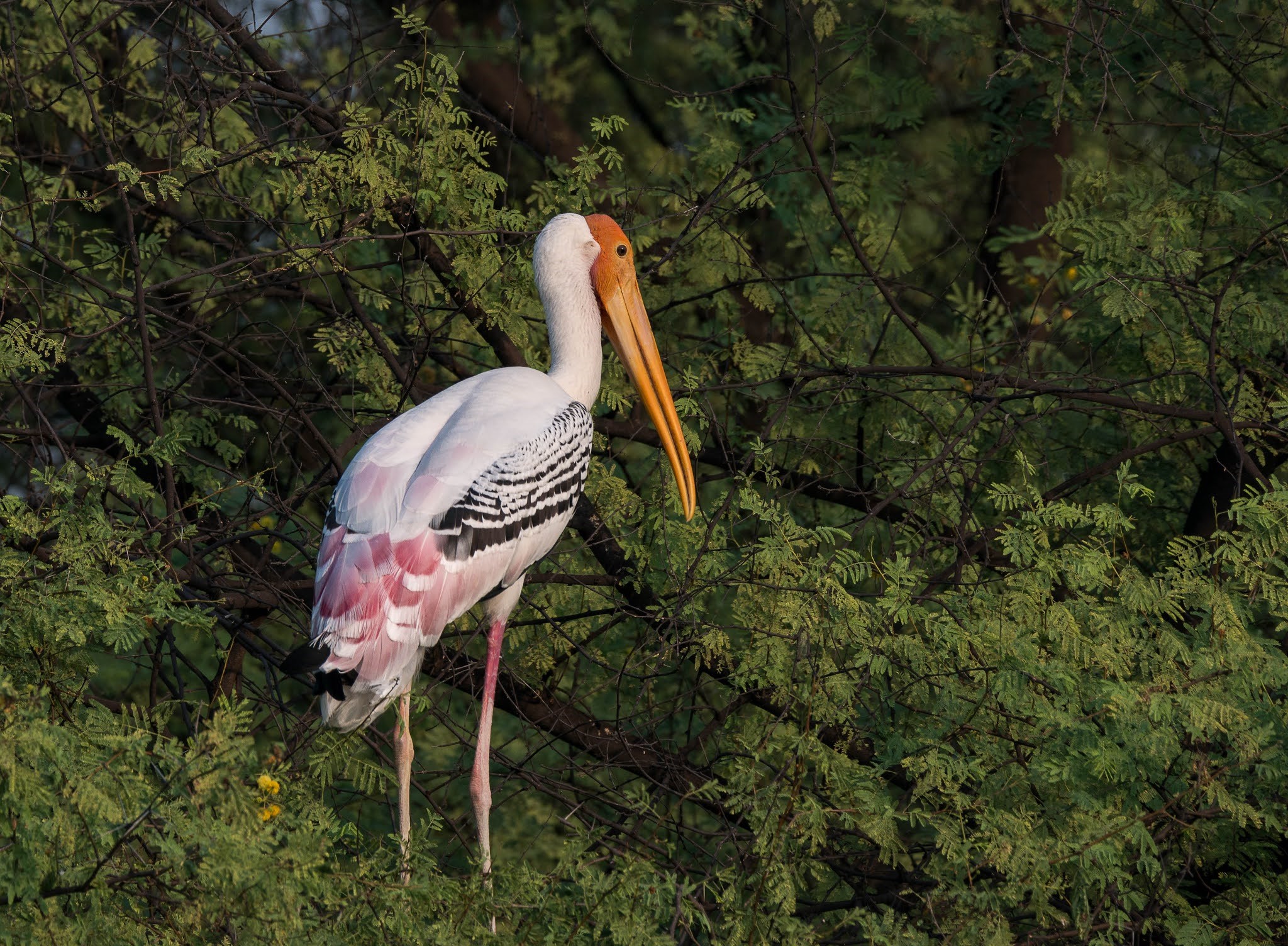
Formerly known as Bharatpur Bird Sanctuary, Keoladeo National Park is a UNESCO World Heritage Site that beckons birdwatchers and nature enthusiasts. Located in Bharatpur, this park is a vital wintering ground for migratory birds, including Siberian cranes, pelicans, and various species of waterfowl. The park’s marshy wetlands and dense vegetation make it a haven for birdlife, and the opportunity to witness the avian spectacle is truly a magical experience.
Eco Stay: Bandh Baretha Eco Resort & Royal Farm Bharatpur
4. discover bandh baretha wildlife sanctuary.

Situated in the heart of Rajasthan’s Bharatpur district, the Bandh Baretha Wildlife Sanctuary sprawls across 199.5 sq km, offering an enchanting tapestry of landscapes and rich biodiversity. Boasting over 200 bird species, including the majestic Sarus Cranes and elusive Black Bittern, it emerges as a haven for avid birdwatchers. Additionally, the sanctuary hosts a diverse array of mammals such as sambar deer and nilgai, adding to its allure. The Kakund River, alongside other water bodies, nurtures a thriving ecosystem, attracting migratory birds during the winter months. Embark on a journey to immerse yourself in the sanctuary’s tranquility and natural splendor, while contributing to its conservation efforts for generations to come.
Eco Stay: Bandh Baretha Eco Resort
5. mount abu wildlife sanctuary: oasis in the arid landscape.

Perched on the only hill station in Rajasthan, Mount Abu Wildlife Sanctuary offers a refreshing contrast to the arid surroundings. Home to a variety of flora and fauna, including the Indian leopard, sloth bear, and various species of deer, the sanctuary provides a cool retreat for wildlife enthusiasts. The Nakki Lake and the Dilwara Temples nearby add to the overall charm of this sanctuary.
Eco Stay: Forest Eco Lodge (Homestay) & Casawood Resort
6. desert national park: where the desert comes alive.
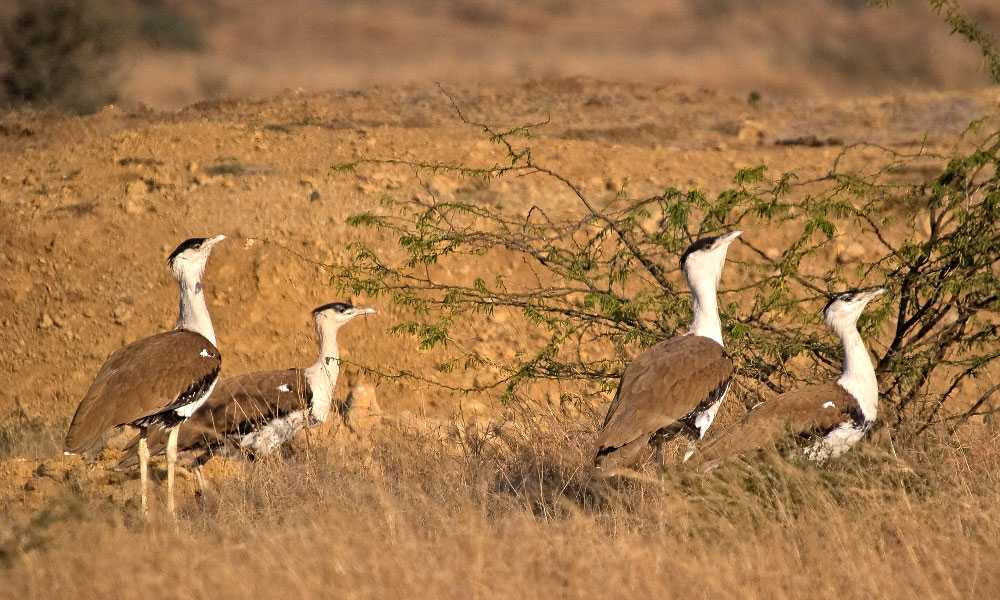
Situated near Jaisalmer, the Desert National Park showcases the unique ecosystem of the Thar Desert. This park is home to various species adapted to the harsh desert conditions, including the elusive Great Indian Bustard. The landscape, marked by shifting sand dunes and rocky formations, provides a surreal backdrop for exploring the flora and fauna specially adapted to the arid environment.
Eco Stay: Desert Drop Resort & Bhavya Resort
7. mukundara hills national park: a hidden gem.

Nestled in the southeastern region of Rajasthan, Mukundara Hills National Park is a relatively lesser-known treasure. Established to protect the critically endangered Bengal tiger, this park is characterized by the scenic Mukundara hills and the serene Kota Barrage. With a rich biodiversity, including species like Indian leopards, sloth bears, and a variety of deer, the park offers a tranquil escape for nature lovers seeking a quieter wildlife experience.
Eco Stay: Chandsen Eco Dera Wellness & Spa
Rajasthan’s commitment to ecotourism is not just a journey – it’s a testament to the harmonious coexistence of humanity and nature. so, let’s embark on this sustainable adventure together, mindful of the impact we leave behind as we traverse the sands of time in this timeless land..
Exploring Bharatpur’s Rich Heritage Beyond the Birds: Unveiling the Hidden Gem of History – Bayana Fort
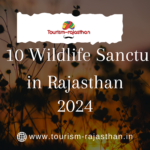
Top 10 Wildlife Sanctuaries in Rajasthan
Related posts, nature and wildlife: a journey from bharatpur to dholpur, from sariska to ranthambore: a wildlife journey, unveiling the ancient temples of rajasthan: a journey through history and faith, write a comment cancel reply.
Save my name, email, and website in this browser for the next time I comment.
- Latest News
- Emergencies
- Ask the Law
- GN Fun Drive
- Visa+Immigration
- Phone+Internet
- Reader Queries
- Safety+Security
- Banking & Insurance
- Dubai Airshow
- Corporate Tax
- Top Destinations
- Corporate News
- Electronics
- Home and Kitchen
- Consumables
- Saving and Investment
- Budget Living
- Expert Columns
- Community Tips
- Cryptocurrency
- Cooking and Cuisines
- Guide to Cooking
- Art & People
- Friday Partner
- Daily Crossword
- Word Search
- Philippines
- Australia-New Zealand
- Corrections
- Special Reports
- Pregnancy & Baby
- Learning & Play
- Child Health
- For Mums & Dads
- UAE Success Stories
- Live the Luxury
- Culture and History
- Staying Connected
- Entertainment
- Live Scores
- Point Table
- Top Scorers
- Photos & Videos
- Course Reviews
- Learn to Play
- South Indian
- Arab Celebs
- Health+Fitness
- Gitex Global 2023
- Best Of Bollywood
- Special Features
- Investing in the Future
- Know Plan Go
- Gratuity Calculator
- Notifications
- Prayer Times
Sheikh Majid lays foundation stone for Luxeglamp eco-tourism project in Umm Al Quwain
Business corporate news.
- Travel & Tourism
Luxeglamp is a luxury, eco-friendly hospitality project

In a move that underscores the importance of eco-tourism and the development of natural areas in Umm Al Quwain, Sheikh Majid bin Saud bin Rashid Al Mualla, Chairman of the Department of Tourism and Archaeology, laid the foundation stone for the Luxeglamp tourist project in the Umm Al Quwain Mangrove Reserve. This project aligns with the emirate's aspirations for sustainable tourism development.
The Luxeglamp project is a strategic initiative aimed at diversifying the emirate's economic base and enhancing the eco-tourism sector, which significantly contributes to the Gross Domestic Product (GDP).
Luxeglamp is a luxury, eco-friendly hospitality project featuring a collection of domes that offer the highest standards of hospitality. Each aspect of the project has been meticulously designed to minimize environmental impact, incorporating best sustainability practices, including the use of renewable energy sources and water conservation measures.

The project offers a unique accommodation experience within the ancient mangrove reserve, with panoramic views of clear waters, stunning natural scenery, and abundant wildlife.
On this occasion, Sheikh Majid bin Saud bin Rashid Al Mualla stated, "Tourism investment in the Emirate of Umm Al Quwain is an essential part of comprehensive development and a sustainable approach to excellence. The launch of the Luxeglamp project reflects our success in building sustainable projects that align with future aspirations, meet the tastes of visitors and tourists, and enhance new tourism experiences in the emirate."
He affirmed that eco-tourism is a key pillar of the emirate's tourism sector development strategy. Investing in the emirate's natural resources helps highlight the diverse tourism offerings of the UAE.
Mr. Anthony Thomas, founder and CEO of the Luxeglamp project, noted that Umm Al Quwain has emerged as a hidden gem as the UAE continues to evolve as a global destination. He highlighted the emirate's pristine beaches, rich cultural heritage, and stunning natural landscapes, making it a must-visit destination for travelers seeking excellence.
More From Corporate-News

Acube Developments launches ‘Electra’ Tower

Transreport expands into UAE

Medcare's new Royal Speciality Hospital opens in Dubai

Life Pharmacy's Super Sale gains overwhelming response

Many Dubai tenants are still getting eviction notices

Dubai Land Department fines three developers Dh1.5m

DWTCA Free Zone expands to include One Za’abeel

UAE hospital operator to launch affordable clinics

Qatar Airways introduces free Starlink wifi onboard

AD Ports Group sets up new joint venture with Adani
Nortje takes 4-7 as south africa beat sri lanka, arab states support gaza ceasefire mediation efforts, israel army announces death of four hostages in gaza, real madrid sign france captain mbappe on free transfer, dravid confirms t20 world cup as his last assignment.

Get Breaking News Alerts From Gulf News
We’ll send you latest news updates through the day. You can manage them any time by clicking on the notification icon.
We use cookies to ensure best experience for you
We use cookies and other tracking technologies to improve your browsing experience on our site, show personalize content and targeted ads, analyze site traffic, and understand where our audience is coming from. You can also read our privacy policy , We use cookies to ensure the best experience for you on our website.
- Leaders Speak
- Brand Solutions
- Rajasthan Domestic Travel Mart 2024: Fourth edition to promote destination weddings
- Online Bureau ,
- ETGovernment
- Updated On May 30, 2024 at 02:48 PM IST
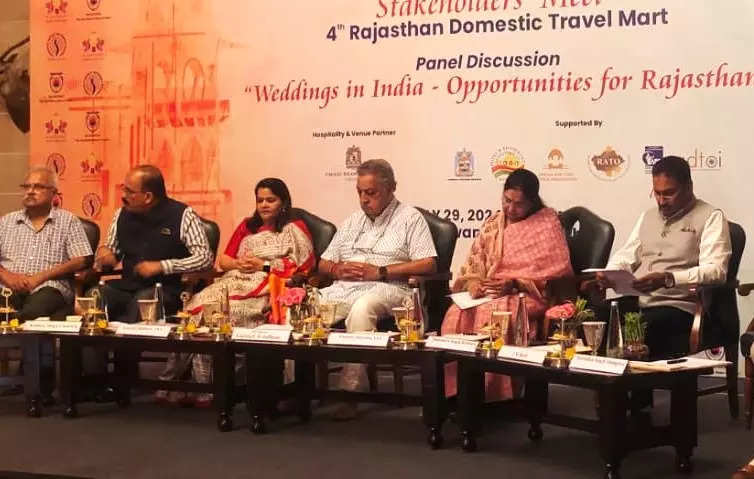
- By Online Bureau ,
- Published On May 30, 2024 at 02:48 PM IST
All Comments
By commenting, you agree to the Prohibited Content Policy
Find this Comment Offensive?
- Foul Language
- Inciting hatred against a certain community
- Out of Context / Spam
Join the community of 2M+ industry professionals
Subscribe to our newsletter to get latest insights & analysis., download etgovernment app.
- Get Realtime updates
- Save your favourite articles
- destination weddings
- Rajasthan Domestic Travel Mart
- tourism sector
- heritage hotels
- meenakshi berry
- Maharaja Gaj Singh

IMAGES
VIDEO
COMMENTS
Rajasthan Eco Tourism Policy Background. Around 9% of state's land is under the administrative control of the Forest Department, with 3 National Parks, 3 Tiger Reserves, 27 Wildlife Sanctuaries, 2 Ramsar Sites, 14 Conservation Reserves and many niche faunal habitats in addition to vast expanse of desert ecosystem, the old Aravalli hill range, rich biodiversity, dense forests, host of water ...
1.6 Rajasthan Tourism Policy, 2020 : Policy Period 8 ... 2.3.2 Adventure Tourism 10 2.3.3 Wild life and Eco-Tourism 11 2.3.4 Tribal Tourism 12 2.3.5 Cultural Tourism 13 2.3.6 Crafts & Cuisine Tourism 14 2.3.7 MICE Tourism 14 2.3.8 Weekend Getaway Tourism 15 2.3.9 Religious Tourism 16 2.3.10 Wedding Tourism 16 2.3.11 ...
Title: Rajasthan Tourism Policy 2020 - English.pdf Author: Amar Created Date: 11/10/2020 1:08:39 PM
2.7. Ecotourism as forestry activity: Eco-tourism aims at experiencing of natural areas while fostering environmental and cultural understanding, and encouraging preservation of wildlife and forests, is a responsible form of tourism. Therefore, the State shall endeavour to identify eco-tourism with forestry activities so
Understanding of the Tourism Sector in Rajasthan 1.4.5 This involved a brief review of the Rajasthan state tourism scenario, the state's tourism policy and understanding the various development initiatives for tourism in the state till date. It also identified the various tourist circuits in the state and has also conducted a brief
The authors have looked into the policies and prospects of wildlife tourism in Rajasthan. The issues and problems related to implementation of the Ecotourism Policy by the government along with the formation of an "Ecotourism Advisory Bureau" also find a prominent place in the chapter. ... Eco-rehabilitation and ecotourism development of ...
Eco-tourism Policy of Rajasthan,2021. In July 2021, the Rajasthan State Government released this policy with the aim to generate economic benefits whilst conserving natural areas and attracting tourism to the state - this is an amendment to the original 2010 policy.
Saka 1931 —Februarv 22, 2010 FOREST DEPARTMENT NOTIFCATION Jaipur. February 15, 2010 RAJASTHAN ECOTOURISM POLICY No. F4 (28) Rajasthan is the largest'state in the country. The geographical area of the state is 34.22 million Ha. of which 3.255 million Ha. is forest area. There are 2 National Parks and 25 Sanctuaries spread over 0.916 million I la.
JAIPUR: The state government on Thursday launched the 'Rajasthan Ecotourism Policy 2021' with an aim to generate economic benefits after conserving natural areas and attracting tourism.
Rajasthan
12 Jul 2021 by Business Traveller India. Rajasthan's new eco-tourism policy will attract domestic travellers as well as create employment opportunities said the minister of state for forest and ...
With the COVID-19 related restrictions being eased in Rajasthan, a new eco-tourism policy set to be brought here shortly is expected to attract domestic tourists and promote the industry.
Rajasthan Tourism Policy, 2020 1 2. Guest House Scheme, 2021 23 3. Government Guest House Scheme for Tourists, 2021 49 4. ... 2.3.3 WILD LIFE AND ECO-TOURISM [a] In view of the growing interest in wildlife and eco-tourism, new sites will be promoted jointly by the Departments of Tourism, Forest and
Rajasthan, often celebrated for its royal palaces, vibrant culture, and desert landscapes, is also making strides in the realm of eco-tourism. In a world increasingly focused on sustainability, Rajasthan is emerging as a destination that combines its rich heritage with a commitment to environmental conservation. In this blog, we'll embark on a journey through Rajasthan's eco-tourism ...
Rajasthan was one of the first states in the country, and one of the first in the world, to adopt a tourist policy in 2001. To provide a strategic framework for the expansion of the tourist industry, the state has produced the "Tourism Policy of Rajasthan." This policy was intended to serve as a roadmap for attracting new capital and attracting ...
The State government has also announced its plan to bring a new eco-tourism policy to explore the potential offered by ecological diversity, with the emphasis on people's participation in the ...
Published on December 28, 2023. Rajasthan takes a significant step in environmental conservation and tourism with the release of the Zonal Master Plan for seven eco-sensitive zones (ESZs). This initiative, led by the state forest department, focuses on preserving the ecological and biological diversity of these areas while also promoting ...
the Rajasthan Tourism Policy 2007-2015. As a result, the number of visitors has increased. Because tourism is so important to the state's economy because of the state's cultural-historic biodiversity, the state government has begun to promote eco-tourism in order to create employment prospects for residents as
22/02/2010 Government of Rajasthan; The main objectives of the eco-tourism policy are: to promote eco-tourism in specified ares of the national parks/ sanctuaries/forests and other areas as a conservation and educational tool; to encourage eco-tourists to visit, enjoy and appropriate the nature on sustainable basis; to enhance the awareness about the need for nature conservation among masses ...
Eco Tourism in Rajasthan. Nestled in the heart of India, the state of Rajasthan is renowned for its vibrant culture, majestic palaces, and arid landscapes. Beyond the deserts and historical wonders, Rajasthan is also a haven for wildlife enthusiasts, boasting a diverse array of flora and fauna within its Wildlife Sanctuaries and National Parks.
The Rajasthan Tourism Policy, 2019 shall remain in operation for a period of 5 years from the date of its notification or for a period ... 2.3.3 Wild life and Eco-Tourism: a. Keeping in mind growing interest in wildlife tourism new sites will be promoted jointly by the Departments of ...
Luxeglamp is a luxury, eco-friendly hospitality project. On this occasion, Sheikh Majid bin Saud bin Rashid Al Mualla stated, "Tourism investment in the Emirate of Umm Al Quwain is an essential ...
The stakeholder meet for the upcoming Rajasthan Domestic Travel Mart (RDTM) was held in Jodhpur on Thursday. In a move set to boost tourism and local employment, His Highness Maharaja Gaj Singh of Jodhpur underscored the importance of destination weddings in Rajasthan at the stakeholder meet for the upcoming Rajasthan Domestic Travel Mart (RDTM). The event is scheduled to take place at Birla ...